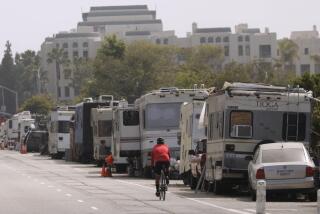Breaking Camp for Homeless : Eviction: Residents of encampment beside the San Diego Freeway collect possessions and get ready to move to parts unknown. The squatters must leave by Sunday, Caltrans officials say.
- Share via
HUNTINGTON BEACH — “Red peppers? Yes? No?” Bare-chested and slightly out of breath, Dale Worley held out a half-empty jar at arm’s length, waiting for a verdict. His friend Don Wilson stared at it for a moment, then shook his head.
“Hell, no sense taking all that stuff. It ain’t like we’re going to have anywhere to put it,” Wilson said. “But keep the hot sauce.”
The two homeless men spent Thursday painstakingly sorting through their possessions--agonizing over what to leave behind and how much to carry to parts unknown. After three years of living in a homeless encampment beside the San Diego Freeway, the pair and a dozen others are being evicted from the state-owned property.
California Department of Transportation officials say the homeless people must leave by Sunday so they can landscape the area as part of a $929,652 highway beautification project.
“It’s a shame,” Wilson said, seated on a well-worn sofa beneath his tent. “What we’d been trying to do here is exist. What little bit we had, people took.”
A church missionary in Westminster has offered the men temporary shelter. But it is only for the short term, Wilson said. It will only be a matter of time before he and his friends find themselves back on the street.
“We don’t have any alternatives,” he said. “Most of the shelters only let you stay for a few days.”
The men tried unsuccessfully to fight their evictions through the legal system; a lawyer won them a temporary reprieve March 18. But 10 days later, Orange County Superior Court Judge Robert E. Thomas gave Caltrans the go-ahead to evict the men, voicing concerns about safety and sanitation at the encampment.
That decision makes Wilson’s blood boil.
“They’re spending thousands and thousands of dollars to clear out these bushes so homeless people won’t have any place to sleep,” Wilson said angrily. “It has nothing to do with ecology or anything else.”
*
Caltrans officials said the men were squatters and did not have permission to be there. Spokeswoman Rose Orem said the camp was also a health hazard.
“We found some very unsanitary conditions there that could have caused some harm to them,” Orem said. “They dug a hole that was their latrine area, so now we have to contact a hazardous materials company to come and clean that out and dispose of the byproducts.”
However, the homeless men said they emptied the latrine regularly and took the waste up to the garbage dump.
“It’s hard to stay clean when you don’t have toilets and showers at your disposal,” said 40-year-old Frank Murphy, a Vietnam vet who became homeless 1 1/2 years ago when he was fired from his handyman’s job and ran out of money. “We did the best we could.”
The camp is invisible from the street, hidden from view by thriving acacia and oleander bushes next to the Beach Boulevard ramp to the San Diego Freeway. A dirt path meanders through the thicket to a shady, tranquil clearing. An American flag draped in front of one tent greets visitors.
The elaborate furnishings inside are a testament to the care that went into the homes. Some have closets, dressers, couches, recliners, vanity areas and other amenities.
The homeless men--and occasionally women--had coexisted with the community at large in relative peace for more than three years. By day, they pushed shopping carts through the neighborhood collecting recyclable cans.
But recently, neighboring businesses began complaining to police about an increase in car break-ins.
Huntington Beach police say they contacted Caltrans to clear the brush from the area to discourage the homeless from living there. They said they believed some of the transients were responsible for some of the thefts.
However, Lt. Charles Poe said it was the residents of a neighboring camp--not the one facing eviction--that caused police to contact Caltrans. “We have never arrested anybody in this particular camp,” he said.
One camp resident, 38-year-old Craig Fritts, said it is unfair to blame him for the crimes committed by other homeless people. On Thursday afternoon, he flipped through a stack of snapshots, reminiscing about happier times.
“We were like one big family,” he sighed. “Now it’s gone.”
More to Read
Sign up for Essential California
The most important California stories and recommendations in your inbox every morning.
You may occasionally receive promotional content from the Los Angeles Times.






